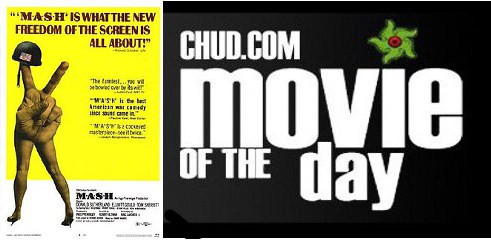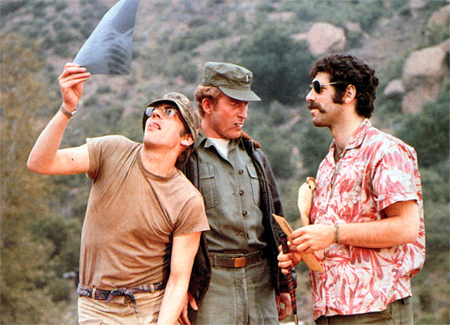
The Film: MASH (1970)
The Principles: Written by Ring Lardner Jr. Directed by Robert Altman. Acted by Donald Sutherland, Elliot Gould, Tom Skerritt, Sally Kellerman, Robert Duvall, Roger Bowen, René Auberjonois, John Schuck, Fred Williamson and Gary Burghoff.
The Premise: We follow a few trauma surgeons around an army post during the Korean war. Capt. Benjamin Franklin “Hawkeye” Pierce (Sutherland) is a laid back womanizer who just happens to be a brilliant surgeon, so he gets away with anything he puts his mind to. “Duke” Forrest (Skerritt) is aggressively into the ladies and a brilliant surgeon, so he gets away with anything he puts his mind to. Trapper John (Gould) is weird, funny, sexually ravenous and very possibly insane, but he’s a brilliant surgeon and… you get the idea. They’re also at times heroic, cruel, awful and selfless. The film is actually about these three men and the Korean War is just a backdrop in order to spend time with these characters.

Is it Good? I know when I was a kid I watched some M*A*S*H (the show) when it was on re-runs, but all I can really remember about it is Alan Alda’s shit-eating grin and Jamie Farr always being shirtless and hirsute. But somehow, even though I am a huge Robert Altman fan, I never managed to see the film. I had always heard it compared unfavorably to the series and so I just never felt a rush to see it. Lately, I’ve been trying to track down a way to watch the entire series (my local library, nor Netflix Instant has it), but I did track down the film and this seemed as good a place to start as any.
MASH is obviously good, but I also found it problematic when it comes down to some of the choices the script makes and with the structure of the second half of the film. The first hour is electrifying in its clarity of character and how effortlessly Altman weaves his fly on the wall directorial style with the organic flow of the overlapping dialogue. As you follow Hawkeye, Trapper John and Duke, the supporting characters weave in and out of their stories perfectly and make the MASH seem like a real, lived in place.
At the 1-hour mark, we get in to the Last Supper scene. The Painless Pole is depressed because he thinks he might have late-onset homosexuality and he’s decided (very calmly and rationally) that he’s going to kill himself. The men stage a last supper with him where they even pose for a moment in da Vinci’s tableau and give him a sleeping pill he thinks is a suicide pill. After Painless has fallen asleep, Hawkeye takes his friend with benefits, Lt. Maria “Dish” Schneider, to Painless’ bed and guilts her into fucking the gay out of him. The next morning, Painless wakes up happy and rested and all is right with the world. I know the film is taking place in 1951 and that thinking was much more prevalent then than it is today (outside of Michelle Bachman and her ilk), but this would have been a good spot to either go into the culture of ignorance and see Painless’ reaction to these sort of ideas. Instead, after he wakes up, he’s happy, no longer suicidal and the film jumps into the next vignette. Why spend such a good sized chunk of the film going into controversial subjects like this one and then back away completely by not allowing any follow-up? Especially since the last 20 minutes of the film is a football game that we have no real reason to care about. Whereas the first half of the film actually feels like a chaotic, brilliant look at these men in this war, the second half becomes too episodic to carry over the raw power and character based humor.
After the Last Supper segment, we go with Hawkeye and Trapper John to Japan so they can perform surgery on the child of a congressman. This section is a lot broader than the movie had been up to that point and if it had lasted much longer, it might have turned Hawkeye and Trapper John into political cartoons more than actual characters. Then the entire final section of the film is a football game between the 4077th MASH unit and the 325th Evac Hospital. Hawkeye and Trapper John get a ringer to play and lay a bunch of bets and then we have what feels like 20 minutes of a football game we really have no stakes in. The other segments in the film seem to work so well because we are dealing with life and death stakes seen through the eyes of characters that never panic and truly don’t give a fuck. Their laid back natures amid all of the violence and insanity is what constantly keeps MASH feeling like a truly transgressive black comedy, but those same natures acting out during a football game felt like time that could have been better spent almost in any other way. The football section makes MASH feel no different than The Longest Yard or Slap Shot with its depictions of difficult men playing games with each other. I’m assuming the point of the football game was to show how invested these men can get with something so trivial in the middle of a war, but with the lengthy amount of time spent on it and the lack of characterizations, it left me wondering where the hell the movie went I started watching.
I read that Robert Altman considered himself a progressive and was using the Korean War as a way to highlight his issues with the Vietnam War, but the way women, homosexuality and minorities are treated in this, I’m a little confused with the social schizophrenia presented. All of the nurses in the film are either easily bedded softies or nagging harpies who become easily bedded softies. I know sexism would have been rampant at that time, but the film doesn’t seem interested in showing things “how they really were” more than employing some magical realism in a very lightly anti-war dramedy. One of the only black people in the film is nicknamed Spearchucker (Williamson) and the nickname doesn’t seem to bother him at all. Not all films need to focus on social issues, I get that, but the casual racism isn’t employed in any other way in this film than casually. Altman is a sometimes subtle director, but his themes are usually pretty easy to spot. With MASH, I felt like his improvisational and chaotic style lent to the film feeling authentic and lived in, but without any overarching thematic material other than “Chaos” to work with. It was either just going for surface level sexism and racism for the shock value, or it undercooked its message about these themes and how they’re treated in military institutions.

Random Anecdotes: Altman was quoted as saying he thought the novel MASH wasn’t very good and complained about the only black character being named Spearchucker. While there are other black characters in the film, Spearchucker is the only one with any sort of significance, so I guess I’m not understanding his complaint.
Sutherland and Gould thought Altman was a madman because of his shooting style and tried to have him fired as the director.
The studio wanted all of the surgery scenes taken out because they felt they were too violent. Altman worked his way around their decision and MASH ended up being what was seen as a groundbreaking comedy/drama at the time.
The final version of the film barely had a single line of dialogue from Ring Lardner Jr.’s script.
Is It Worth A Look: Absolutely. However, I do think the film version of Catch-22 captured the insanity of war black comedy vibe much better than MASH did. I know I spent a lot of this review harping on the film, but the combination of overlapping dialogue, great characters and perfectly cast actors make it worth a view.
Cinematic Soulmates: Catch-22, Apocalypse Now, Stripes, The Longest Yard, Slap Shot.